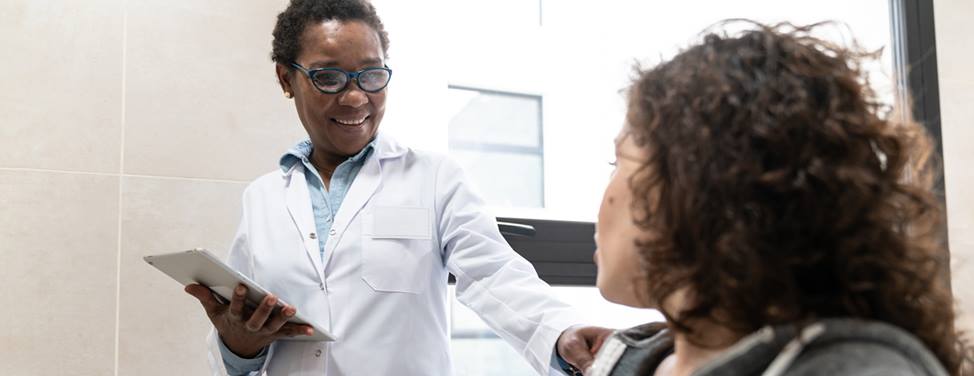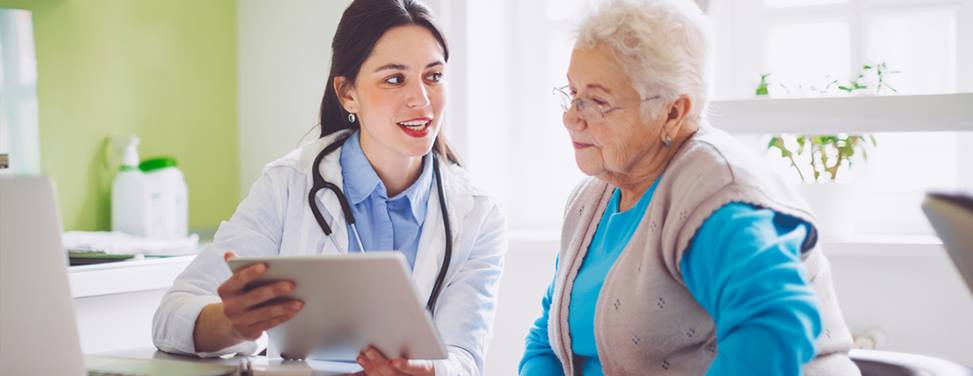It is not uncommon during the first few office visits to feel overwhelmed and forget much of what is said. You might consider bringing a family member or loved one to your first few visits. Having another person there to ask questions and review the information with you afterward can be extremely helpful.
It's a good idea to bring a notebook with a list of questions for your doctor and a pen to jot down important information. You can also ask your doctor to send you a copy of their evaluation and treatment recommendations.
If you need help preparing for your doctor visit, the Consultation Planning program at the Patient and Family Cancer Support Center is a free service that can help you identify your key questions and concerns. Those questions and concerns are then organized into a flow chart, which serves as a guide for your discussion with the doctor. Call the UCSF Cancer Resource Center at (415) 885-3693 for more information.
Continue reading
Diagnosis
- What stage is my cancer?
- Can you tell if this is a fast-growing type of cancer or a slow-growing type?
Tests
- What tests will I have?
- What will these tests tell me about my cancer?
- How long after I have these tests will it take to get the results?
- Who will call me with the test results? Or, who should I call to get the results?
- If I need copies of my records, scans, X-rays and so on, who do I contact?
- Do I have to do anything special to prepare for the tests?
- Do these tests have any side effects?
Doctors
- How many doctors will be involved in my care? Who are they? What are their roles?
- Who will be the doctor in charge of coordinating my care and the rest of the doctors?
- What other health care professionals can I expect to be involved in my care?
Treatment
- What is the standard treatment for my type of cancer?
- How many patients have you treated with this treatment? What were the results?
- How does this compare with other institutions?
- What is the future outlook (prognosis) for my type of cancer with standard treatment?
- Are there any other treatments that might be appropriate for my type of cancer?
- What treatment do you recommend? On what do you base your recommendation?
- What are the risks or benefits of the treatment you're recommending?
- Who would you recommend that I talk to for a second opinion?
- What percentage of patients usually respond to this treatment?
- How long does each treatment last?
- How long is the entire course of therapy?
- How often will I be treated?
- What type of results should I expect to see with the treatment?
- Will there be tests during my treatment to determine whether it's working?
- What will the treatments feel like?
- Can someone accompany me to my treatment?
- Can I drive to and from my appointments? Is parking available?
- Can I stay alone after my treatments, or do I need to have someone stay with me?
- Will I have to be in the hospital to receive my treatments?
- Who will administer my treatments?
- How often, during treatment, will I see a doctor? The nurse?
- Will a reduction in or delay of the recommended therapy reduce my chances of being cured?
- Are there foods or medications or activities that I should avoid while I am going through treatment?
- How soon after treatment can I go back to work?
Clinical Trials
- Are there any clinical trials or research being done on my type of cancer?
- Are there any clinical trials that you particularly recommend?
- Am I a candidate for any of the clinical trials that you recommend?
- Where can I find related research information?
- Is there anyone else in the area involved in research that I might contact to discuss my cancer?
- How much time do I have to make a decision about my treatment options?
Financial Issues
- Will the required treatment require out of pocket expenses?
- Is there someone in your office (or facility) who assists patients with questions about insurance? Who would that be?
- If my insurance doesn't pay for a particular treatment or medication, will you recommend an alternative treatment? What if it is less effective?
- Who can I talk to about getting treatment if I don't have insurance?
- Who can I talk to about pharmacy assistance programs if my insurance doesn't cover a particular medication?
Support
- Where can I get literature about my illness?
- Are you willing to speak to my spouse or other family members about my illness and my treatments?
- Where can I find out about support groups?
- Can I speak to someone who has undergone this type of treatment?
- Is there a social worker I can talk with?
- Is there a dietitian on staff if I have nutritional concerns or difficulties?
- Do I need to be on a special diet?
- Are there any lifestyle changes you would recommend?
- Who do I call if I have an emergency medical situation during my treatment, or shortly afterward?
- What telephone numbers should I have in order to reach you? The nurse? The hospital?
Side Effects
- Should I watch for any particular symptoms?
- How likely are they to occur?
- What should I do if I have side effects?
- Who should I call if I experience severe side effects?
- What can be done to prevent these side effects or reduce their severity?
- When might these side effects occur?
- Could these side effects be life threatening?
- How long will the side effects last?
- What treatments are available to manage side effects?

































